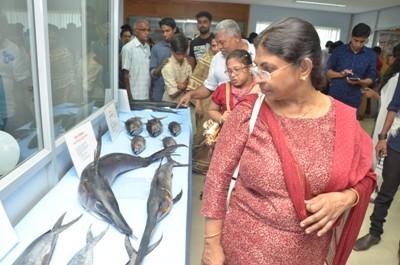KOCHI, 04 February 2018 : The open house, an exhibition cum education programme, held by the Central Marine Fisheries Research Institute (CMFRI) on its 71st foundation day on Saturday here highlighted the impact of climate change in fisheries. Aimed at creating awareness among the public, the CMFRI displayed the research output of the study on climate change conducted under the scheme of the National Innovations on Climate Resilient Agriculture (NICRA).
Explaining the details of the study to the visitors who thronged the CMFRI to understand the latest developments in the marine research and enjoy the wonders of marine biodiversity, the scientists said that there had been changes in scores of areas such as sea surface temperature (SST), chlorophylla, wind and rainfall, ocean current, spawning season, maturity, distribution and catch of various marine fishes owing to the climate change.
They further said that shift in distribution of commercially important fish resources affects the catch and thereby livelihoods and national economy to sustainable level.
“Climate change coupled with the intense fishing pressure has an adverse effect in fisheries resources”, said Dr P U Zacharia, Project Coordinator of the NICRA. Adaptive measures such as reducing fishing efforts, forestration of mangroves, farming of seaweeds and promotion of cage fish farming are need of the hour, he said.
According to the NICRA study report, habitat mapping and ecological modelling could be done to prevent over-exploitation and manage climate stressors.
During the open house, students and the public also got an opportunity to enjoy a rare privilege of getting a ringside view of the secrets of marine life. As part of the programme, the National Marine Biodiversity Museum, various state-of-the-art laboratories, marine research aquarium, Agricultural Technology Information Centre (ATIC) and hatcheries were opened to the public.
The visitors also displayed keen interest in understanding the functioning of the fish ageing laboratory of the CMFRI. The laboratory uses state-of-the-art equipment to find out the age of the fishes and the scientists explained to the visitors the various stages involved in the process. Models of cage fish farming, aquaponics, ornamental fish farming, recirculating aquaculture system (RAS) etc. were demonstrated to the public.
The visitors also interacted with the scientists and engaged in discussions on the issues and challenges being faced by the marine fishery of the country. Laboratories related to molecular biology, bioprospecting, cell culture, fishery biology, environmental research, climate change, ocean acidification etc. also were opened to the public during the programme.
Awareness on dangers of dumping plastic wastes into water ecosystem also was held. Information service was provided at the all exhibition stalls arranged under the aegis of 10 Divisions of CMFRI. The museum, which is designated as the National Repository by the Union Government, was the main attraction to the visitors.
The Antarctic krills, horse shoe crab, sea snakes, sea birds, pearl oyster, sea cow, sharks, penguin and dolphins were the main attraction at the museum.




















